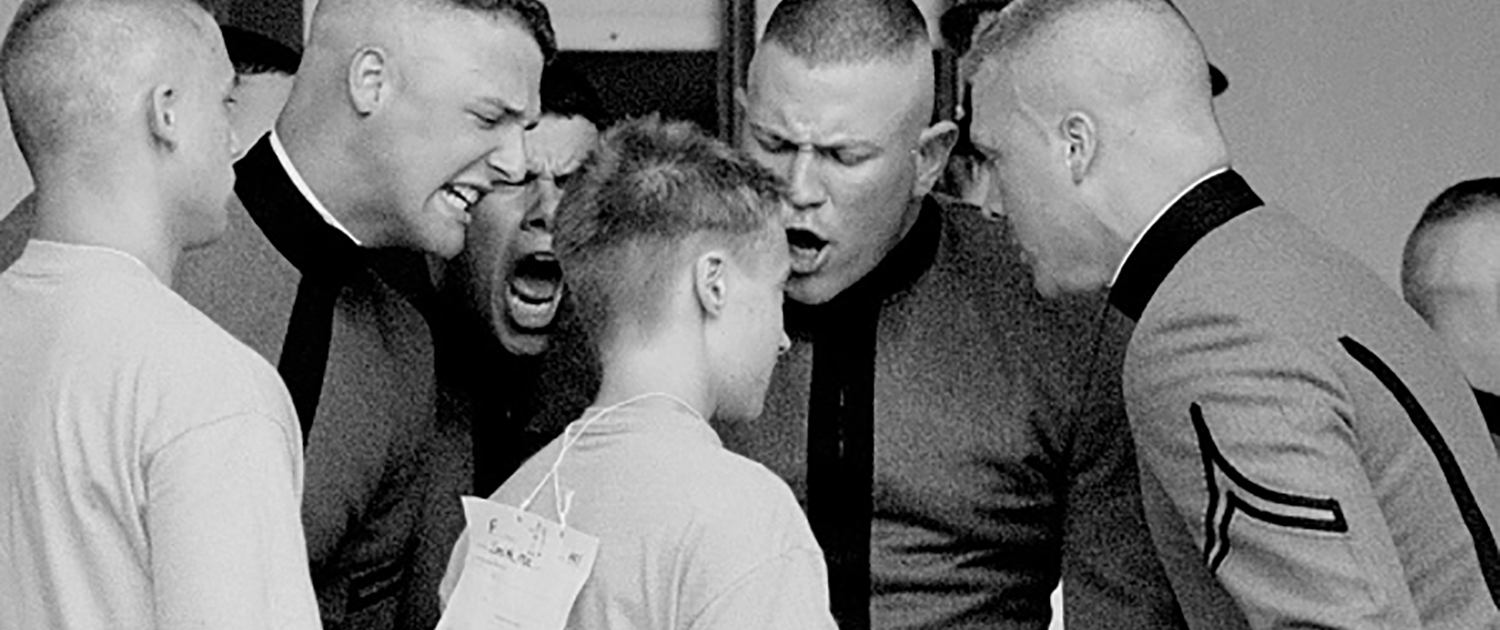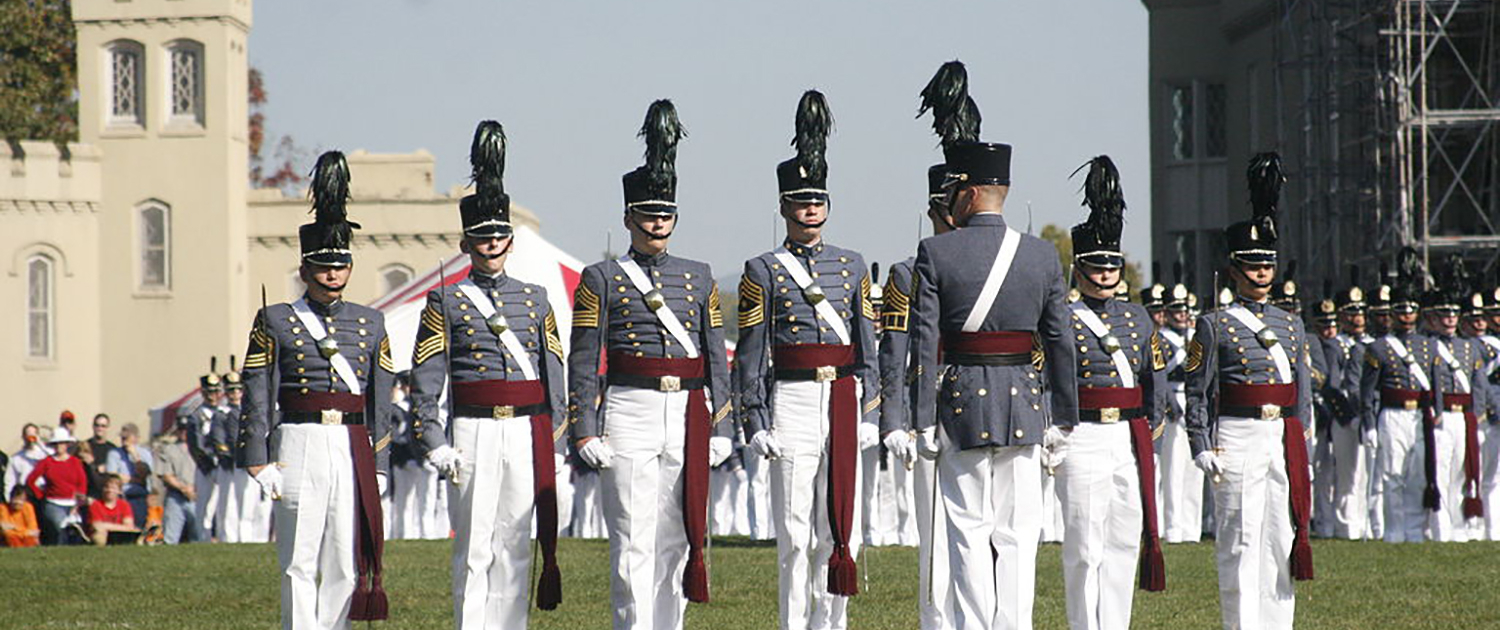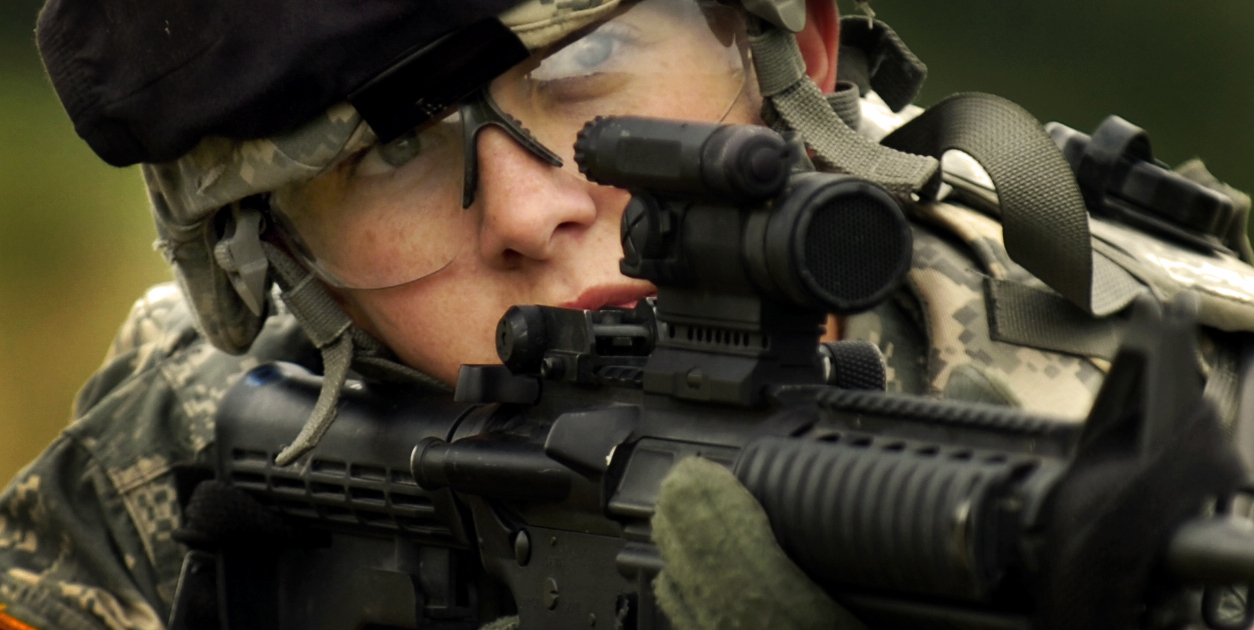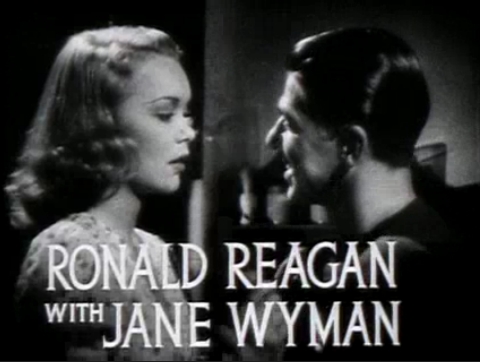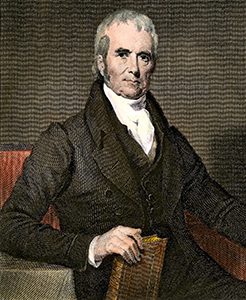Pop Civ 5: United States v. Virginia
Female Rat Megan Smith faces her cadre, one of 30 women in a class of nearly 500 VMI cadets.
Credit: The Washington Post/Nancy Andrews
Introduction
To continue our focus on Women’s History Month, we turn to one of the nation’s landmark cases involving access to higher education for women, where it was “defender of a gender line” versus “equal protection.”
When the Virginia Military Institute was established in 1839, the notion that a center for military education might admit female students would have been an alien concept. Created as Virginia’s answer to the United States Military Academy at West Point, VMI sought to mold “citizen soldiers” who would respond to it’s nation’s call to action when needed, and saw numerous alumnae rise to prominence as military powerhouses. Generals George Marshall and George S. Patton both matriculated at the Institution, and by the mid-20th century, the school was synonymous with military excellence.
Only a few decades later, however, VMI began to feel the impact of the anti-military sentiment that followed the Vietnam War. By the early 1980s, applications to VMI were down, and thanks to increased requirements in the armed services’s recruitment policies, the school could no longer guarantee a commission in the armed services to its graduates.
At the same time, the public began to focus its attention on the integration of women into all-male spaces, and bastions of military masculinity were not exempt from this sweeping change. The first class to include female students graduated from West Point in 1980, signaling a significant shift in whether the nation believed women were suited for and welcomed in places like its most esteemed military academy. By contrast, VMI remained staunchly opposed to admitting women, and, in 1986, its Board of Visitors reaffirmed the Institute’s policy to provide training and education exclusively to men.
The Cadet Regimental Commander gives commands to the Corps of Cadets during the parade at the Virginia Military Institute. Credit: worked released into the public domain.
Shortly thereafter, VMI came under scrutiny from the U.S. Justice Department’s Civil Rights Division (CRD). In 1989, the CRD sent a letter of inquiry to VMI’s superintendent on behalf of an anonymous female high school student who wished to apply to the school but was disqualified because of gender. The letter requested that VMI reassert whether or not it would continue to restrict admission to men only, and, if so, to spell out its reasoning for that decision. VMI’s administration balked at the challenge and stood their ground. By contrast, some Virginia officials, including Governor Gerald Baliles, believed that the school was clinging to outdated policies. Citing not only the Equal Protection Clause of the U.S. Constitution’s Fourteenth Amendment but also Virginia’s own Constitution, Baliles said,
“If the student in question meets all of the requirements for admission to VMI, I see no justification for the Institute to preclude her attendance simply because she is a woman.”
Despite mounting pressure, VMI continued to uphold its male-only admission policy. In 1990, the Justice Department filed a gender discrimination suit against the school, focusing in part on VMI’s status as a public institution receiving state funding. While that case made its way through the courts, a new, state-sponsored, female counterpart to VMI was established at Mary Baldwin College, the Virginia Women’s Institute for Leadership (VWIL). Although VMI won that case in the U.S. District Court, appeals were filed and eventually the case came before the Supreme Court in 1996 as United States v. Virginia.
Theodore B. Olson, representing Virginia, argued that the adversative methods VMI used to shape its Cadets would be negatively affected by the admission of women to its ranks. Lower courts had agreed that the typical woman would be incapable of participating in the intense practices used by VMI to mold its Cadets. Paul Bender, arguing the case for the United States, challenged those findings, stating that those opinions were based on stereotypical assumptions of women’s abilities to withstand the rigors of those experiences, rather than on data that proved women were not fit for the exercises.
Additionally, Virginia contended that the newly created VWIL provided a constitutionally adequate alternative for women interested in attending an institution with a military focus. The United States refuted that argument, explaining that VWIL was in no way comparable to VMI in reputation, academic rigor, or military prestige. The United States did not claim that single-sex schools were unconstitutional in their own right; instead, they argued that if Virginia’s only prestigious military academy was restricted exclusively to male students, women in the Commonwealth were being denied equal access to those educational opportunities because of their gender.
In the end, the Court decided that VMI had failed to provide “exceedingly persuasive justification” for its male-only admission policy and was in violation of the Fourteenth Amendment. Justice Ruth Bader Ginsburg read the opinion for the 7-1 decision, stating:
“The heightened review standard applicable to sex-based classification does not make a proscribed classification but it does mark as presumptively invalid incompatible with equal protection a law or official policy that denies to women simply because they are women equal opportunity to aspire, achieve, participate in, and contribute to society based upon what they can do.
Under this exacting standard reliance on overbroad generalization typically male or typically female tendency estimates about the way most women or most men are will not suffice to deny opportunity to women whose talent and capacity place them outside the average description.
(Justice Clarence Thomas recused himself from the case, as his son was enrolled at VMI at the time).
As this Court said in Mississippi University for women against Hogan some 14 years ago state actors may not close entrance gates based on fixed notions concerning their roles and abilities of males and females …
…To cure that violation and to afford genuinely equal protection, women seeking and set forth a VMI quality education cannot be offered anything less.”
Justice Antonin Scalia, the lone dissenter on the Court in this case, wrote a scathing dissent of the majority opinion, writing:
“Today, however, change is forced upon Virginia, and reversion to single sex education is prohibited nationwide, not by democratic processes but by order of this Court. Even while bemoaning the sorry, bygone days of ‘fixed notions’ concerning women’s education … the Court favors current notions so fixedly that it is willing to write them into the Constitution of the United States by application of custom built ‘tests.’ This is not the interpretation of a Constitution, but the creation of one.”
Lexington, USA – April 18, 2018: Virginia Military Institute female, woman cadet in uniform walking on green grass lawn during a sunny day in front of Clayton Hall. Credit: istock photo: ablokhin
Following the Court’s decision, VMI was ordered to permit women to be admitted to the Institute. Initially, VMI planned to make itself a private college, thereby skirting the requirements of the Court for a public institution. The United States Department of Defense, however, threatened to withdraw all ROTC programs from the school if it went private. The VMI Board of Visitors would eventually vote 9-8 to admit female students, ending its tenure as the last public university restricted to men. During that meeting, VMI’s Superintendant referenced Justice Ginsburg’s opinion:
“[She] says some women have the will and capacity to succeed in the training and attendant opportunities that VMI uniquely affords. We are going to take her at her word.”
In preparation for the 1997-98 school year, VMI mailed applications to female high school students who had expressed interest in the Institute following the Supreme Court decision in 1996. Everything from sleeping quarters to the terminology used to describe cadets had to be reevaluated in advance of women being admitted to VMI. From creating female-only shower facilities to adding private examination rooms in the school’s hospital, VMI prepared itself for its first female students.
Cadet Sarah McIntosh, the first female cadet to serve in a United States war from Virginia Military Institute, looks through the sites of her M-4 rifle during training in June 2007 at Camp Atterbury Joint Training Center. Credit: Photo by Sgt. 1st Class Russell Klika
United States v. Virginia
Similar case at the Citadel
At the same time as Virginia was grappling with how VMI should be allowed to treat female applicants, a similar situation was unfolding two states away in South Carolina. The Citadel, that state’s prestigious military academy, had also been open only to male candidates, when Shannon Faulkner, a student from Powdersville, SC, tested the boundaries of the school’s admission policies. An honor roll student with excellent transcripts, Faulkner was frustrated by the Citadel’s male-only policy and decided to apply regardless of the fact that she was female. Asking her guidance counselor to generate a set of transcripts that omitted any reference to gender, Faulkner mailed in her application, and in January of 1993, received a letter of acceptance from the Citadel. A few weeks later, after having been tipped off by a Citadel alumnus who happened to know Faulkner was female, the school sent out a new letter, addressed to “Ms. Faulkner” this time, revoking her admission on the basis of her gender. Faulkner eventually filed suit against the Citadel, and, in 1995, the institution was ordered to admit her. That same year, under escort by United States Marshals, Faulkner joined nearly two thousand male students as the first and sole female member of the Citadel.
Brother Rat
VMI has long enjoyed a national reputation that even made its way to the silver screen. In 1938, future President Ronald Reagan starred in Brother Rat, a comedy-drama that explored the lives of young cadets at VMI. Based on a 1936 Broadway play that garnered public acclaim, the film follows three cadets weeks away from their graduation. The title is inspired by the term “brother rat,” used by VMI alumni to refer to their fellow classmates, and rooted in the first-year experiences of new cadets. Starting with the “Rat Line” where incoming freshmen are required to walk at attention through prescribed routes in their barracks, new cadets undergo a series of challenges designed to build a sense of deference to and community with their older classmates. As many VMI graduates will say, “once a Brother Rat, always a Brother Rat,” citing the lifelong bonds forged at the Institution.


